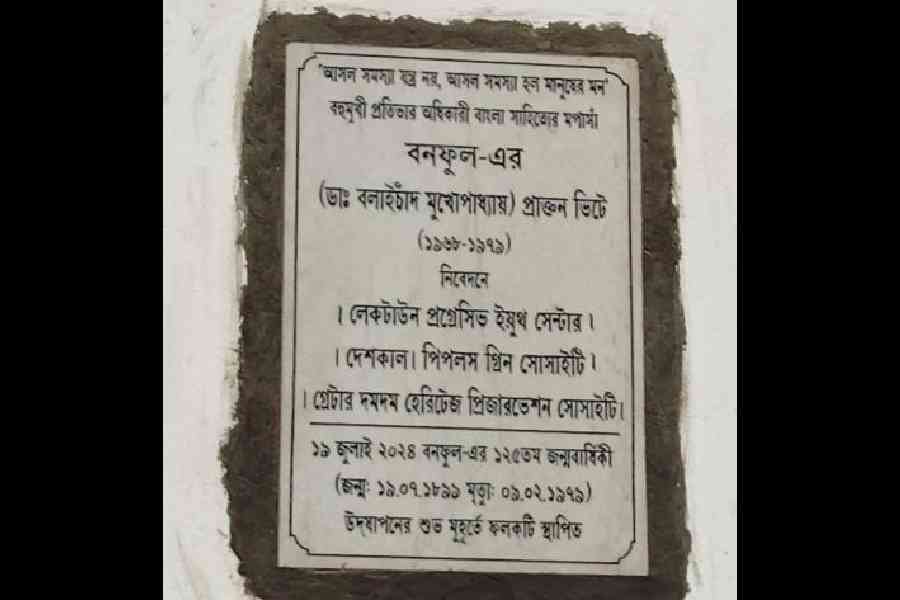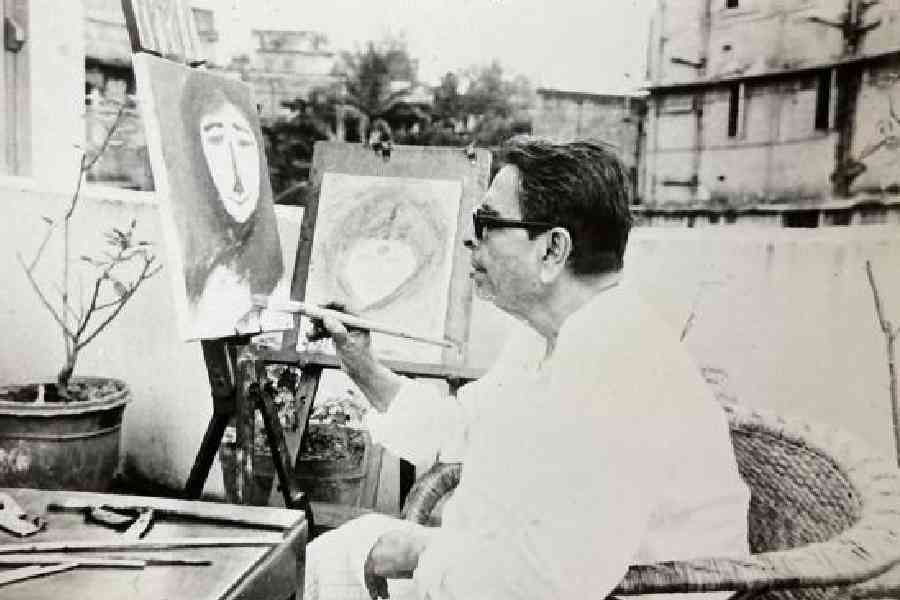The five-storeyed building that bears the address of P66 in Lake Town Block B may not have been the home where Dr Balaichand Mukherji, who is known by his nom de plume Banaphool, spent his last years but now it bears a plaque that identifies the plot as where the celebrated author once lived. The organisations which joined hands to install the plaque want the road connecting the clock tower on VIP Road with Jessore Road to be named after the author who spent the last 11 years of his life in the area.
The plaque was installed on the building façade, under the first floor verandah railings, on the occasion of Banaphool’s 125th birth anniversary on July 19. “Every year, we garland Banaphool’s statue on his birthday but this being a milestone year, we thought of doing something special. The plaque will let passersby know about the site’s connection with the author who introduced us to micro fiction and is known as the Maupassant of Bengali literature,” said Shyamal Ghosh, secretary of Deshkal, a research centre specialising in the history of east Calcutta. French author Guy de Maupassant is best known for his short stories.
Deshkal tied up with the local club Lake Town Progressive Youth Centre and approached the residents of the house for permission. “Our building started being built in 2005 and we are living here since 2008. It is a matter of honour for us that we live at the same address as Banaphool. Some of the elderly neighbours in our locality remember him and have even collected Saraswati puja subscription from him,” said Parimal Kanti Das, the building secretary, who is also a club member.
Ghosh says many eminent personalities visited Banaphool at the Lake Town house. “This included Uttam Kumar (who starred in Agnishwar, a film based on Banaphool’s eponymous novel) but there is no record,” he lamented.
Digital drive
Attending the unveiling of the plaque was the author’s grandson Mahiruha Mukherji, who stays close by, in the same block, in a house built by his father Chirantan Mukherji. “My grandfather died in February 1979. I was born in the two-storeyed building at P66 that year in June but we shifted when I was only four years old, in 1983. So I never saw him, nor do I remember the building,” the 44-year-old said.

A plaque installed in Banaphool's honour at the site of the author's former residence
The civil engineer, who runs the family firm and is used to reading books on his tab, has his own dream regarding his grandfather. “I plan to digitise all his work. He should be present in the digital space to be accessible to everyone. With Artificial Intelligence becoming able to process large amounts of data, language will become easily translated and will no longer be a restricting factor,” he said, adding that he is starting with Banaphool’s novels including Hate Bajare, Agnishwar, Dui Pathik and Swapnasambhab.
Mahiruha remembers celebrations during Banaphool’s birth centenary in 1999. “A stamp came out and a train was named Hate Bajare Express. A film festival was held at Nandan screening films based on my grandfather’s works. Even now, films get made on his stories, the latest being Kamaleshwar Mukherjee’s Ektu Shore Boshun, a 2023 release that was based on the short story Pasha Pashi,” he said.
Deshkal, in collaboration with the Lake Town Progressive Youth Centre and Greater Dum Dum Heritage Preservation Society, held a programme at the club where a documentary film, titled Brintalagna Banaphool, was screened.
Three people were also bestowed with Banaphool Smriti Purashkar — Dr Alok Guha, East Calcutta Wetlands preservation activist Dhruvaa Dasgupta and Srabani Pal, professor of Bengali at Rabindra Bharati University who has written a book on Banaphool’s works. “Banaphool had written 44 of his 60-odd novels, 12 plays and seven collections of poems while he was in Bhagalpur. So it may be presumed that the rest were written after he came to Lake Town. He also took up art late in life,” Pal said.
A tree plantation programme was also announced with People’s Green Society. “Every year, we hold a tree plantation in Banaphool’s name as Forest Week starts the day after his birthday,” said Ghosh. The trees were later planted in the East Calcutta Wetlands.
Deshkal is planning to start a mass signature campaign in the area to press for the renaming of the road after Banaphool.
Gradually, the day was finalised. The wedding would be in Sambalpur. Sejdi is smart. She has written: “I have sent the children to Bardi in Lahore. One should not witness a father’s marriage.” That made me sigh in relief.
In time, I begged and pleaded with the boss to grant me a few weeks’ leave and set off. All alone. This wedding is not to be publicised. I even shaved off the moustache. As it is, I am dark and plump. On top of that, to go with a thick salt and pepper moustache seemed wrong.
The wedding hall
So this girl with her face covered will be my bride? One day, I had got Prabha like this. She left who knows where! Today one more has come. Who knows how her kidneys are! Random thoughts played in my head. Prabha’s face appeared again and again. Who knows what the children are up to? Does the spirit last after death? This girl seems rather big. But she is sitting rather tight, with her head bent. What if Prabha’s spirit…
The wedding rituals continued mechanically. The girl refused to shed her ghomta during shubho drishti. Sejdi said she was very shy. Even on the wedding night, she lay covered from head to foot, turning to a side. I too slept off. Sejdi did not let a crowd gather at the door. Who cares for fun and games in a second marriage? The girl had no one of her own. She was brought up in a distant relation’s house. The wedding was at Sejdi’s place. Practically Sejdi represented the bride’s side. So the marriage ceremony was not a happening one.
Things happened, on the phulsojja night
With trepidation and hope in my heart, I stepped into the room to find Prabha seated on the bed with my six children and a newborn. Was I dreaming?
Prabha said: “Shame, shame. Sejdi won!”
— “What?”
— “What else? This time delivery was very painful. My only fault was telling Sejdi that he would be distraught if I died. Sejdi said: ‘Bullshit! He would marry within three months.’ I said: ‘Never!’ Then Sejdi and Binod placed a bet and planned this conspiracy. I was in Santipur. We came this evening. And found victory was Sejdi’s. She got the lad Manke to pose as a bride and won the bet. Hand over a hundred bucks. Shame, shame. What are you, men? And why did you shave off that moustache?”
My state was beneath description.
The next morning, Sejdi’s due was cleared. Hope the moustache grows back soon.
(Translated from the short story Adwitiya by Sudeshna Banerjee)










